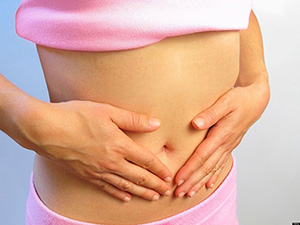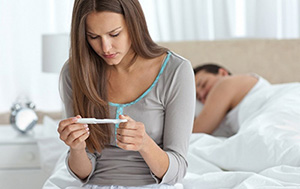 After the end of the IVF protocol, every woman feels like she is in limbo. She is waiting for menstruation, and is very afraid of her: after all, this will mean that the attempt to get pregnant was unsuccessful.
After the end of the IVF protocol, every woman feels like she is in limbo. She is waiting for menstruation, and is very afraid of her: after all, this will mean that the attempt to get pregnant was unsuccessful.
When does menstruation begin after IVF? What should be considered as menstruation, because after replanting the embryo, there are bloody discharge in the norm? When do you need to urgently call or go to the doctor, and when does the situation endure? And, finally, how to understand when there is no more hope?
Menstruation after IVF
When menstruation begins after IVF depends on two factors:
 First. Whether fertilization was successful or not
First. Whether fertilization was successful or not
It takes only 40 hours for an embryo to implant. In this case, by about 3 days, a woman may notice scanty spotting, and her stomach may also hurt "as with menstruation." There is no need to worry about this, it is too early to run to do the hCG test. Observe yourself: if such a "daub" becomes more and more scarce, and then stops, you can determine the coveted hormone in 5-6 days (although it is better - after all, on the 14-15th day).
There is also a "but" here. The embryo can develop in the uterine cavity and attach as early as 10 days after replanting. This is a variant of the norm called late implantation. Then you need to look:
- if it is monthly on the 10th day after IVF, then they will be very abundant, clots, lumps of mucus will come out, which may well resemble an embryo. Menstruation - if the discharge of blood from the vagina will be noted for at least 3 days.
Attention! Bloody discharge that lasts longer than 10 days is no longer monthly, but uterine bleeding!
- if it is implantation bleeding, it will be very scarce. It may be reddish at first, but then brown. If at the same time the stomach pulls, you need to lie down as much as possible, call your doctor and then, if he recommends, donate blood for hCG.
Attention! The appearance of symptoms such as nausea, enlargement of the mammary glands, changes in mood, changes in taste before 14 days cannot be regarded as pregnancy!
Second. What are the features of the body
It is important here what the hormonal background was before the protocol, what the cycle was before the start of the use of hormone preparations. It also matters which protocol was used. The organismic factor is the most difficult to predict.
It depends on your personal characteristics if your periods went ahead of time or, on the contrary, 14 days have passed, the hCG test is negative, but there is still no menstruation. To find out the reasons and identify deviations that could have manifested itself against the background of IVF, you need to contact gynecologists.
A doctor's consultation is necessary if you are concerned about the question "what to do if the menstrual cycle is disturbed?"
Menstruation after unsuccessful IVF
 If the embryo could not implant, menstruation normally begins 3-14 days after embryo replanting (this usually occurs 3-5 days after the supportive drug is discontinued).
If the embryo could not implant, menstruation normally begins 3-14 days after embryo replanting (this usually occurs 3-5 days after the supportive drug is discontinued).
If this does not happen, a medical consultation is needed! The reasons can be different, including bad habits of a woman, and experienced psychological stress, which negatively affects the pituitary gland, causing hormonal disruption.
What is considered the norm after a failed protocol:
- and unusually painless, and, conversely, painful periods after IVF;
- profuse menstruation;
- discharge of clots and fragments of the endometrium (what may resemble a "child" or "embryo")
The first menstruation after IVF "has the right" to be unusual. In the second month, there may also be deviations, but there should no longer be an abundant discharge of blood. In general, the menstrual cycle can be established for about a year, which should not cause panic.
Attention! In the first 2-6 months after an unsuccessful IVF, the chances of a natural pregnancy are maximum!
After IVF there is no period and the test is negative
If there is no period after an unsuccessful IVF, you should not think about a medical error! Moreover, you can not take any drugs to maintain pregnancy. If on day 14 after replanting the embryo, hCG is negative - you will have to survive this failure, but be sure to consult a doctor to find out the reasons for the delay.
A doctor's consultation should be urgent (by phone - with the attending physician, and if he does not answer - in any 24-hour gynecological hospital) in such cases:
- before the protocol, the cycle was within 25 days;
- swelling appeared;
- it became difficult to breathe;
- the temperature has risen.
Thus, if you donate blood for hCG on the 14th day after embryo replanting, and the result is negative, this condition should be regarded as a delay in menstruation. This requires a visit to a doctor and examination!
